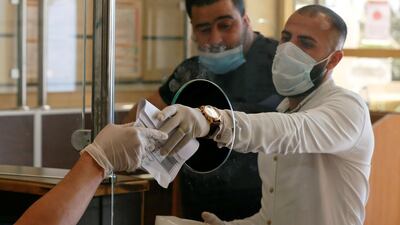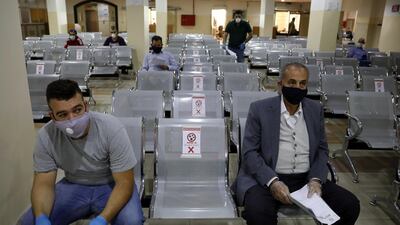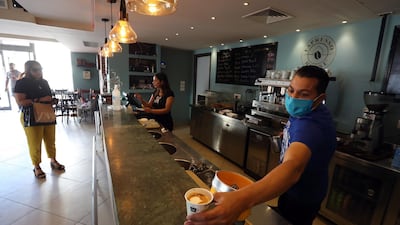On any given morning in living rooms and kitchens around the world, NaTakallam language tutors settle down in front of their laptops and prepare to teach Arabic, Spanish, French and Farsi to eager, home-bound students.
The online language service, taught entirely by refugees, has seen an explosion of interest since global coronavirus lockdowns began.
Not only do they offer a new skill, but learners also have the opportunity to swap lockdown stories with people in far flung places, such as Italy or South America, via videocall.
"For the Covid-era we were perfectly placed because we're already in the digital realm," Aline Sara, co-founder and CEO of NaTakallam, told The National by phone from Paris.
The organisation was formed in Lebanon in 2015, and now has tutors teaching four languages from 25 different countries.
“The nice thing about confinement, within certain populations who are still getting their salaries and who are still comfortable, is that everyone has turned to online education and learning,” Ms Aline said.
This has meant a 100 per cent increase in one-on-one language sessions in March, and 150 per cent growth in April, keeping refugees, many of whom are settling into new lives away from their home country, a steady revenue stream.
The service has been a lifeline for some of the tutors, 60 per cent of whom use the one-on-one lessons to support themselves entirely. The rest usually supplement their incomes from other jobs, but have perhaps found themselves unemployed due to the crisis.
The increase in interest has allowed the social enterprise to disburse 30 per cent more cash to refugee tutors since the crisis began.
“I actually thought that I would be jobless, as I only had a few students with NaTakallam at the beginning of the pandemic,” said Saeed Alaktaa, a Syrian refugee living in Brazil, who lost his teaching job at an English school.
“But thank god, my work with NaTakallam increased, and now I work almost full time. I’m so thankful that I’m still working.”
The bonds between teacher and student are also growing closer due to the crisis, as language learners check in with refugees to see how they are doing.
“I received more students than before, they all want to know how things are going in Italy because the virus was spreading all over the country,” said Noor Alkasseer.
Ms Alkasseer fled the nine-year conflict in Syria to Lebanon, where she first began working with NaTakallam. In 2018 she was resettled in Milan, in the Lombardy region of Italy. Lombardy was hit hard by the coronavirus crisis, with 86,384 cases and over 15,500 deaths.
“Some people who were my students called me to ask if I was okay, it was such a kindness from them,” Ms Alkasseer said, adding that without commuting to her other job, she has time to talk to family in Syria and Canada and pursue hobbies.
The lessons bring in an income, but also stave of isolation, Ms Aline said.
She tells of a refugee tutor in Costa Rica who is alone in a new home as her flatmates relocated to be with their families. For her, NaTakallam lessons are the only interaction she has most days.
“That's really the most powerful component of NaTakallam; that human connection, the human friendship that's developed,” said Ms Aline.
The organisation looks very different from its beginnings in Lebanon in 2015. Alongside language tutoring, it offers lessons for entire university and school classes and professional translation services. Both services have been disrupted, but not cancelled by the crisis.
Mr Aline sees "gloomy" days ahead for refugees, but hopes her organisation can offer light at the end of the tunnel for some.
"The language classes are empowering because you're teaching your own language and your own culture and it almost serves as ... indirect psychosocial support because you're lifting someone out of isolation, you're lifting someone out of their feelings of uselessness," she said.
Pavel Corro, a Venezuelan conversation partner for NaTakallam in Argentina, said the service offers more than language to customers, too.
"It has been an incredibly positive experience for me so far, it allowed me to know my students much more," he said, describing three students whose Spanish has improved drastically under lockdown and who he now counts as friends.
"The classes have allowed my students to release tension or anxiety as we just talk about anything else that's not the virus. We don't pretend it doesn't exist, we just try to have a positive outlook".

















